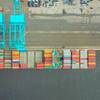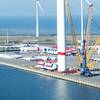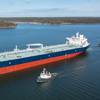Banks Won't Fund Coal Port Expansion near Reef
Germany's largest bank, Deutsche Bank AG, has declared it will not finance a controversial coal port expansion in Australia near the Great Barrier Reef, responding to calls from environmental groups and tourism operators.
HSBC, Europe's biggest bank, also signalled on Friday it would be unlikely to finance the project.
Deutsche Bank's stand marks a win for those opposed to $26 billion worth of coal projects that plan to use the Abbot Point port, already facing delays due to weak coal prices.
But one company involved said the bank's position made no difference. "This doesn't impact our proposed projects in any way," Indian firm GVK Hancock spokesman Josh Euler said.
Green groups and marine operators fighting to protect the World Heritage-listed reef took their campaign to Europe this week, urging Deutsche Bank, Societe Generale and HSBC not to back the Queensland coal projects.
They want to stop a government-approved expansion of Abbot Point that would involve dumping 3 million cubic metres of dredged soil about 25 kilometres (15 miles) from the Great Barrier Reef, an issue that is also of concern for UNESCO's World Heritage committee.
Campaigners against the Abbot Point expansion failed to win support from Societe Generale on Tuesday, according to their web site, but were successful at Deutsche Bank's annual meeting on Thursday. (http://www.marketforces.org.au/europecoalfinance)
"As we have seen, there is currently no consensus between UNESCO and the Australian government regarding the expansion of Abbot Point in the vicinity of the Great Barrier Reef. Our policy requires such a consensus at the least," Deutsche Bank co-chief executive Juergen Fitschen said at the annual meeting.
"We therefore would not consider applications for the financing of an expansion any further," he said.
Deutsche Bank was targeted because it helped refinance the lease on Abbot Point.
HSBC's Chief Executive Stuart Gulliver said his bank had not received any proposals to finance the project and would need to consider it if one were made, but added it would appear to fall foul of its commitment to the Equator Principles - a framework adopted by banks to determine whether to lend on projects where there is environmental and social risk - and UNESCO's position.
"If you look at what we set out in terms of the Equator Principles and if UNESCO's stance is as you say, I think it would be extraordinarily unlikely that we would go anywhere near it," he said when asked at HSBC's annual shareholder meeting on Friday to make a commitment not to fund the project.
Greenpeace said Australia's big four banks, which it is pressing to cut funding to the coal industry, should take note.
The operator of Abbot Point, North Queensland Bulk Ports Corp, defended the port plan saying there is "rigorous scientific evidence" to support an environmentally sustainable expansion of the port and criticised the anti-coal campaign.
"This is one of the strategies that these groups and individuals are employing, that is to increase investor risk through creating uncertainty and a heightened perception of risks over coal investments," NQBP spokeswoman Mary Steele said.
The port expansion would be needed to export coal from massive new mines planned by Indian firms Adani Enterprises and GVK, which is working with Australian billionaire Gina Rinehart. Adani had no immediate comment.
(By Sonali Paul; Additional reporting by Steve Slater in London; Editing by Richard Pullin, Tom Hogue and Mark Potter)













